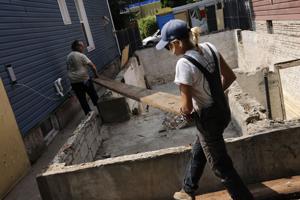Top Stories
Toronto Company Revolutionizes Deconstruction to Save Waste

UPDATE: A groundbreaking initiative in Toronto is transforming how homeowners approach renovations by prioritizing deconstruction over demolition. The company Ouroboros Deconstruction is leading the charge, helping residents salvage valuable materials instead of sending them to landfills, an urgent move as the city grapples with waste management challenges.
Donald MacPherson, who recently inherited a bungalow off the Danforth, chose to deconstruct his late uncle’s home rather than face the costly repairs. “My uncle would have loved this,” MacPherson remarked, highlighting the emotional connection to the materials. This decision comes as Toronto seeks to reduce its staggering waste production of 2.1 million tonnes annually.
Authorities report that nearly a quarter of landfill waste comes from construction, renovation, and demolition activities. With landfills nearing capacity, deconstruction is emerging as a sustainable alternative. MacPherson hired Ouroboros Deconstruction, which specializes in recovering materials that would otherwise be discarded. CEO Meredith Moore founded the company after witnessing the excessive waste in her neighborhood during the pandemic.
As workers meticulously dismantled MacPherson’s house this summer, they salvaged doors, windows, sinks, and even vintage joists made from precious old-growth hemlock and spruce. “This kind of lumber is gold,” said Steph Bonic, COO of Ouroboros. The company aims to divert materials from landfills while often providing services at costs comparable to traditional demolition.
The environmental impact is significant. Currently, Toronto’s construction industry only diverts 12 percent of its waste from landfills, a stark contrast to household recycling rates that exceed 50 percent. Critics like waste campaigner Emily Alfred argue that current regulations are insufficient, allowing much of the waste to end up in private landfills with little oversight.
Ouroboros Deconstruction’s innovative approach not only saves materials but also creates a marketplace for salvaged goods, providing homeowners and builders with access to rare, high-quality timber. Moore emphasizes the growing awareness around deconstruction, noting that many are surprised to learn it is a viable option.
As the movement gains traction, cities like Portland and Amsterdam have implemented regulations to require deconstruction for certain projects. However, Toronto still lacks such mandates, prompting advocates like Alfred to call for stricter policies to ensure sustainable practices within the construction sector.
Looking forward, the deconstruction movement in Toronto is set to expand. With increasing public interest and the rising costs of disposal, more homeowners are expected to consider deconstruction as an alternative. Moore believes this could lead to a deconstruction ecosystem that not only preserves the environment but also enriches the community.
As Toronto continues to explore sustainable solutions for its waste crisis, the success of Ouroboros Deconstruction serves as a model for other cities. The urgent need for innovative approaches to waste management is clear, and the actions taken today could pave the way for a greener tomorrow.
-

 World4 months ago
World4 months agoScientists Unearth Ancient Antarctic Ice to Unlock Climate Secrets
-

 Entertainment4 months ago
Entertainment4 months agoTrump and McCormick to Announce $70 Billion Energy Investments
-

 Lifestyle4 months ago
Lifestyle4 months agoTransLink Launches Food Truck Program to Boost Revenue in Vancouver
-

 Science4 months ago
Science4 months agoFour Astronauts Return to Earth After International Space Station Mission
-

 Technology2 months ago
Technology2 months agoApple Notes Enhances Functionality with Markdown Support in macOS 26
-

 Top Stories3 weeks ago
Top Stories3 weeks agoUrgent Update: Fatal Crash on Highway 99 Claims Life of Pitt Meadows Man
-

 Sports4 months ago
Sports4 months agoSearch Underway for Missing Hunter Amid Hokkaido Bear Emergency
-

 Politics3 months ago
Politics3 months agoUkrainian Tennis Star Elina Svitolina Faces Death Threats Online
-

 Politics4 months ago
Politics4 months agoCarney Engages First Nations Leaders at Development Law Summit
-

 Technology4 months ago
Technology4 months agoFrosthaven Launches Early Access on July 31, 2025
-

 Top Stories1 week ago
Top Stories1 week agoFamily Remembers Beverley Rowbotham 25 Years After Murder
-

 Entertainment4 months ago
Entertainment4 months agoCalgary Theatre Troupe Revives Magic at Winnipeg Fringe Festival




















